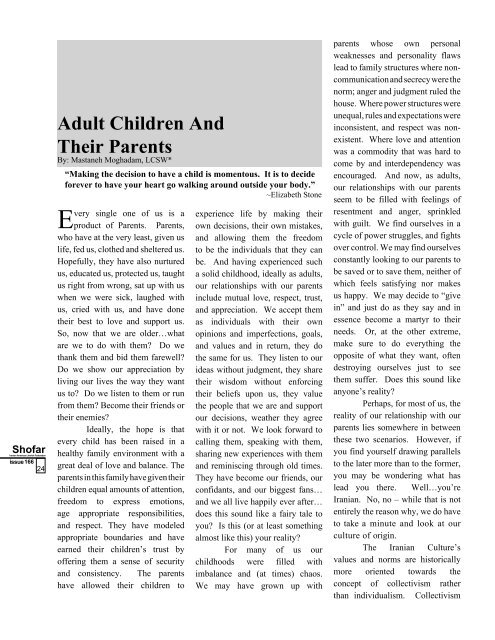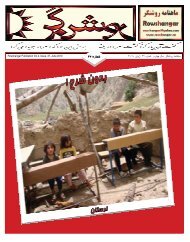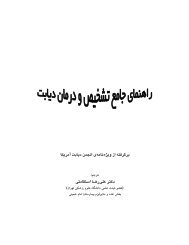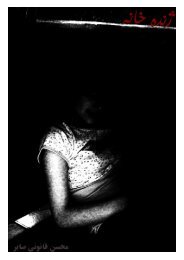166 - ketab farsi
166 - ketab farsi
166 - ketab farsi
Create successful ePaper yourself
Turn your PDF publications into a flip-book with our unique Google optimized e-Paper software.
<strong>166</strong><br />
24<br />
Adult Children And<br />
Their Parents<br />
By: Mastaneh Moghadam, LCSW*<br />
“Making the decision to have a child is momentous. It is to decide<br />
forever to have your heart go walking around outside your body.”<br />
~Elizabeth Stone<br />
Every single one of us is a<br />
product of Parents. Parents,<br />
who have at the very least, given us<br />
life, fed us, clothed and sheltered us.<br />
Hopefully, they have also nurtured<br />
us, educated us, protected us, taught<br />
us right from wrong, sat up with us<br />
when we were sick, laughed with<br />
us, cried with us, and have done<br />
their best to love and support us.<br />
So, now that we are older…what<br />
are we to do with them? Do we<br />
thank them and bid them farewell?<br />
Do we show our appreciation by<br />
living our lives the way they want<br />
us to? Do we listen to them or run<br />
from them? Become their friends or<br />
their enemies?<br />
Ideally, the hope is that<br />
every child has been raised in a<br />
healthy family environment with a<br />
great deal of love and balance. The<br />
parents in this family have given their<br />
children equal amounts of attention,<br />
freedom to express emotions,<br />
age appropriate responsibilities,<br />
and respect. They have modeled<br />
appropriate boundaries and have<br />
earned their children’s trust by<br />
offering them a sense of security<br />
and consistency. The parents<br />
have allowed their children to<br />
experience life by making their<br />
own decisions, their own mistakes,<br />
and allowing them the freedom<br />
to be the individuals that they can<br />
be. And having experienced such<br />
a solid childhood, ideally as adults,<br />
our relationships with our parents<br />
include mutual love, respect, trust,<br />
and appreciation. We accept them<br />
as individuals with their own<br />
opinions and imperfections, goals,<br />
and values and in return, they do<br />
the same for us. They listen to our<br />
ideas without judgment, they share<br />
their wisdom without enforcing<br />
their beliefs upon us, they value<br />
the people that we are and support<br />
our decisions, weather they agree<br />
with it or not. We look forward to<br />
calling them, speaking with them,<br />
sharing new experiences with them<br />
and reminiscing through old times.<br />
They have become our friends, our<br />
confidants, and our biggest fans…<br />
and we all live happily ever after…<br />
does this sound like a fairy tale to<br />
you? Is this (or at least something<br />
almost like this) your reality?<br />
For many of us our<br />
childhoods were filled with<br />
imbalance and (at times) chaos.<br />
We may have grown up with<br />
parents whose own personal<br />
weaknesses and personality flaws<br />
lead to family structures where noncommunication<br />
and secrecy were the<br />
norm; anger and judgment ruled the<br />
house. Where power structures were<br />
unequal, rules and expectations were<br />
inconsistent, and respect was nonexistent.<br />
Where love and attention<br />
was a commodity that was hard to<br />
come by and interdependency was<br />
encouraged. And now, as adults,<br />
our relationships with our parents<br />
seem to be filled with feelings of<br />
resentment and anger, sprinkled<br />
with guilt. We find ourselves in a<br />
cycle of power struggles, and fights<br />
over control. We may find ourselves<br />
constantly looking to our parents to<br />
be saved or to save them, neither of<br />
which feels satisfying nor makes<br />
us happy. We may decide to “give<br />
in” and just do as they say and in<br />
essence become a martyr to their<br />
needs. Or, at the other extreme,<br />
make sure to do everything the<br />
opposite of what they want, often<br />
destroying ourselves just to see<br />
them suffer. Does this sound like<br />
anyone’s reality?<br />
Perhaps, for most of us, the<br />
reality of our relationship with our<br />
parents lies somewhere in between<br />
these two scenarios. However, if<br />
you find yourself drawing parallels<br />
to the later more than to the former,<br />
you may be wondering what has<br />
lead you there. Well…you’re<br />
Iranian. No, no – while that is not<br />
entirely the reason why, we do have<br />
to take a minute and look at our<br />
culture of origin.<br />
The Iranian Culture’s<br />
values and norms are historically<br />
more oriented towards the<br />
concept of collectivism rather<br />
than individualism. Collectivism

















